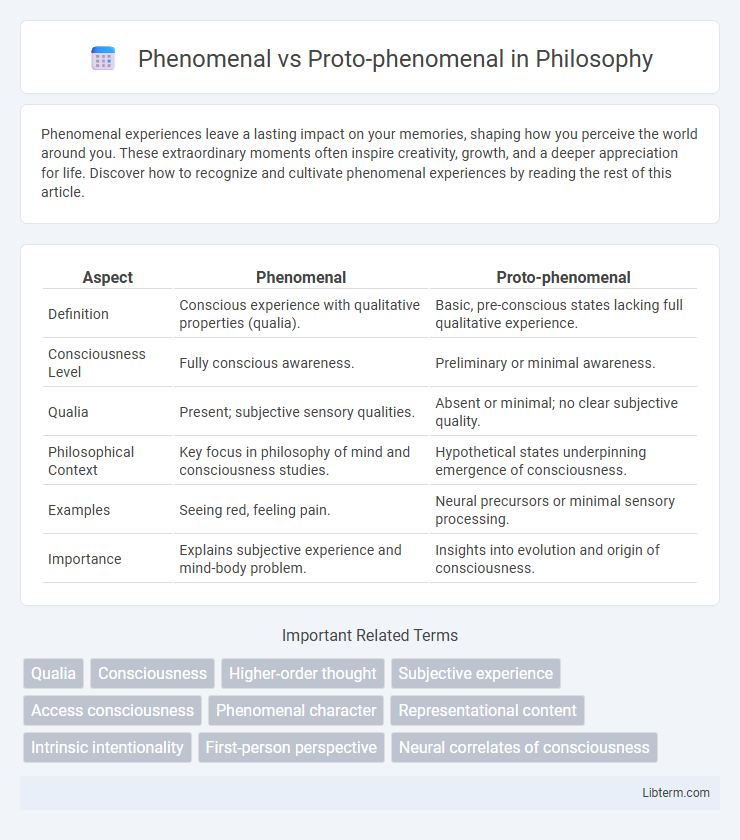Phenomenal experiences leave a lasting impact on your memories, shaping how you perceive the world around you. These extraordinary moments often inspire creativity, growth, and a deeper appreciation for life. Discover how to recognize and cultivate phenomenal experiences by reading the rest of this article.
Table of Comparison
| Aspect | Phenomenal | Proto-phenomenal |
|---|---|---|
| Definition | Conscious experience with qualitative properties (qualia). | Basic, pre-conscious states lacking full qualitative experience. |
| Consciousness Level | Fully conscious awareness. | Preliminary or minimal awareness. |
| Qualia | Present; subjective sensory qualities. | Absent or minimal; no clear subjective quality. |
| Philosophical Context | Key focus in philosophy of mind and consciousness studies. | Hypothetical states underpinning emergence of consciousness. |
| Examples | Seeing red, feeling pain. | Neural precursors or minimal sensory processing. |
| Importance | Explains subjective experience and mind-body problem. | Insights into evolution and origin of consciousness. |
Introduction to Phenomenal and Proto-phenomenal Concepts
Phenomenal experience refers to the qualitative aspects of consciousness, encompassing the vivid sensory and perceptual content directly accessible to an individual. Proto-phenomenal states represent the foundational, pre-conscious structures that underlie and potentially give rise to full phenomenal awareness without being fully developed experiences themselves. Understanding the distinction between phenomenal and proto-phenomenal concepts is essential for exploring the stages and mechanisms of consciousness in cognitive science and philosophy of mind.
Defining Phenomenal Consciousness
Phenomenal consciousness refers to the subjective experience and qualitative feel of sensations, often described as "what it is like" to be aware of a particular state. Proto-phenomenal consciousness denotes the basic, pre-reflective sensory processing that lacks the rich, qualitative aspects characteristic of full phenomenal experience. Defining phenomenal consciousness emphasizes the distinct, vivid inner awareness that differentiates human cognition from mere sensory responsiveness.
Understanding Proto-phenomenal Properties
Proto-phenomenal properties refer to the most basic, non-conscious building blocks of experience that exist prior to full phenomenality, as proposed in theories of consciousness like panpsychism. Understanding these properties involves examining how fundamental physical processes might possess primitive experiential qualities that combine to form complex conscious states. Research into proto-phenomenal properties explores the transition between purely physical phenomena and subjective awareness, highlighting their role in bridging materialism with experiential reality.
Historical Background: Origins of the Distinction
The distinction between phenomenal and proto-phenomenal experiences originated from early 20th-century philosophical discussions on consciousness and perception, particularly within the works of philosophers like Franz Brentano and Edmund Husserl. Phenomenal experience refers to the qualitative, first-person aspects of consciousness, while proto-phenomenal relates to pre-conscious or foundational sensory experiences that do not yet possess full subjective awareness. This historical differentiation paved the way for contemporary debates in philosophy of mind and cognitive science regarding the nature and emergence of conscious experience.
Key Philosophical Perspectives
Phenomenal consciousness refers to the subjective experience or qualia that characterize how it feels to perceive, think, or feel, often emphasized in debates on the mind-body problem. Proto-phenomenal consciousness, as explored in theories like panpsychism, suggests a basic, rudimentary form of experience present even in fundamental physical entities, laying the groundwork for complex awareness. Key philosophical perspectives, including those of Thomas Nagel and David Chalmers, distinguish between these levels to address the explanatory gap between objective physical processes and subjective experience.
Phenomenal Properties: Characteristics and Examples
Phenomenal properties refer to the subjective qualitative aspects of conscious experience, such as the redness of a rose or the pain of a headache, which are intrinsic and directly accessible only to the experiencer. These properties are characterized by their qualia, the individual instances of conscious sensation that define how something feels from the first-person perspective. Examples of phenomenal properties include the taste of chocolate, the sound of a violin, and the sensation of warmth, all highlighting the vivid, experiential qualities that distinguish conscious states.
Proto-phenomenal Properties: Nature and Significance
Proto-phenomenal properties refer to the fundamental, non-conscious precursors in the physical substrate that give rise to phenomenal experiences, representing the bridge between purely physical states and subjective awareness. These properties are crucial in panpsychist and emergentist theories as they offer a framework to understand how consciousness could emerge from complex physical interactions without invoking dualism. Understanding proto-phenomenal characteristics provides insight into the nature of experience by identifying the minimal physical conditions necessary for subjective phenomena to arise.
Comparative Analysis: Phenomenal vs Proto-phenomenal
Phenomenal experience involves fully realized conscious states characterized by subjective qualities such as sensory perception and emotional feelings, whereas proto-phenomenal states represent rudimentary or pre-conscious conditions lacking explicit awareness yet possessing potentiality for conscious experience. Comparative analysis reveals that phenomenal states exhibit a higher degree of neural integration and complexity, supporting vivid qualia, while proto-phenomenal states operate at a more basic neurophysiological level, often identified in simpler organisms or early developmental stages. Understanding the distinction aids in unraveling the evolution of consciousness and informs cognitive neuroscience research into the gradations of awareness.
Implications for the Philosophy of Mind
Phenomenal consciousness refers to the subjective experience of sensations and feelings, while proto-phenomenal states represent primitive or pre-conscious processes underlying these experiences. Understanding the distinction informs debates on the nature of qualia, challenging physicalist accounts by suggesting that some mental states possess intrinsic qualities not fully captured by objective descriptions. This differentiation drives new theories in the philosophy of mind, emphasizing the need to bridge the explanatory gap between neural processes and conscious experience.
Future Directions and Open Questions
Future research on phenomenal versus proto-phenomenal states should explore the neural correlates distinguishing full conscious experience from its primitive precursors, emphasizing precise biomarkers and brain network patterns. Investigations into developmental trajectories and evolutionary origins could clarify how proto-phenomenal experiences transition into rich phenomenal consciousness. Open questions remain about the functional roles of proto-phenomenal states in cognition, their presence across species, and methods for objectively measuring subjective experience gradations.
Phenomenal Infographic

 libterm.com
libterm.com